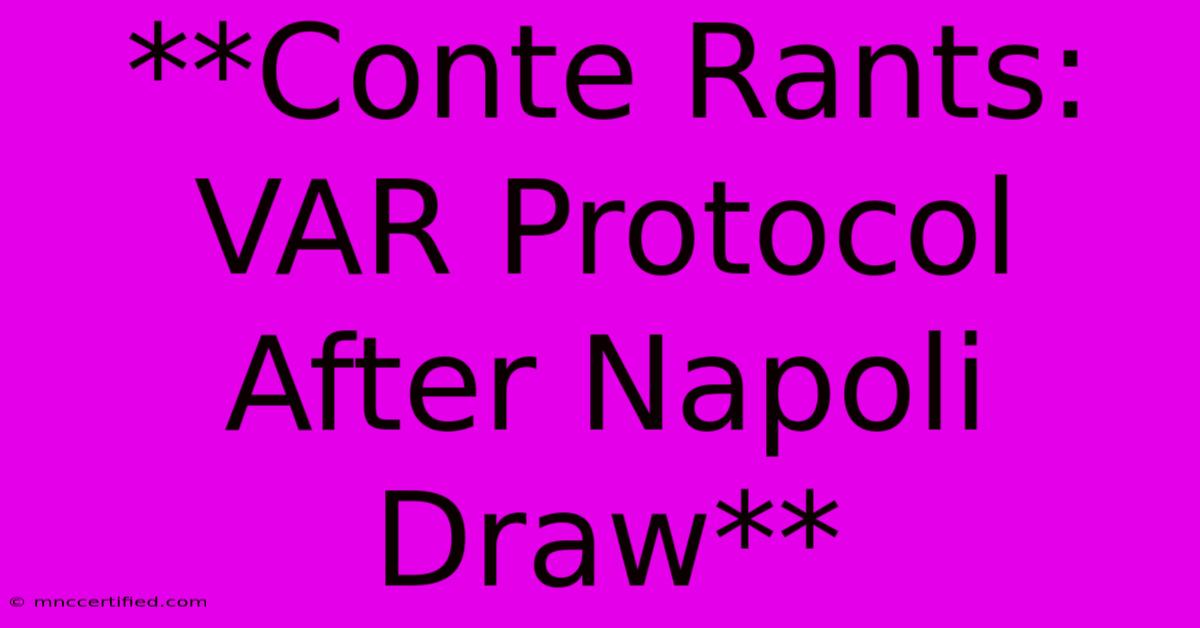**Conte Rants: VAR Protocol After Napoli Draw**

Table of Contents
Conte Rants: VAR Protocol After Napoli Draw
Antonio Conte has never been one to hold back his emotions, and after his Tottenham Hotspur side drew 0-0 with Napoli in the Champions League, the Italian manager let loose a torrent of frustration, specifically targeting the VAR protocol.
Conte's Outburst: A Call for Consistency
The match, played at the Diego Armando Maradona Stadium, was a tense affair with few clear-cut chances. However, it was a controversial incident in the 82nd minute that ignited Conte's fury. Spurs defender, Cristian Romero, appeared to handle the ball inside the penalty area, but the referee, Szymon Marciniak, didn't award a penalty.
"It's incredible. It's not possible to have this kind of VAR, where you see a player clearly handle the ball in the box, the referee looks at the monitor, and still doesn't give a penalty," Conte stated, his voice filled with disbelief. "This is not football. This is not fair play."
VAR Controversy: A Recurring Theme
This isn't the first time Conte has voiced his displeasure with the VAR system. He's been a vocal critic of its implementation in the Premier League, often bemoaning its inconsistency and lack of clarity.
"We need to have a clear understanding of the VAR protocol. When does it intervene? When doesn't it? It's a system that's supposed to help the game, but it often creates more problems than it solves."
Spurs' Draw: A Missed Opportunity
While Conte focused his ire on the VAR controversy, the result itself was a missed opportunity for Spurs. A win against a formidable opponent like Napoli would have been a significant boost to their Champions League campaign.
However, the draw leaves them with a difficult task ahead. They'll need to perform well in their remaining group games, including a crucial clash against Eintracht Frankfurt, to secure qualification for the knockout stages.
Beyond Conte's Rants: The Future of VAR
Conte's outburst highlights the ongoing debate surrounding the implementation of VAR. While its aim is to improve the accuracy of refereeing decisions, it has often been criticized for its subjective interpretations and inconsistencies.
The question remains: How can the VAR protocol be improved to ensure fairness and clarity for all stakeholders involved?
As the technology continues to evolve, the answers to these questions will be crucial in shaping the future of the game and ensuring that VAR plays a truly positive role.

Thank you for visiting our website wich cover about **Conte Rants: VAR Protocol After Napoli Draw**. We hope the information provided has been useful to you. Feel free to contact us if you have any questions or need further assistance. See you next time and dont miss to bookmark.
Featured Posts
-
Trump Picks Zeldin As Epa Head
Nov 12, 2024
-
Tooth Bonding How Long Does It Last
Nov 12, 2024
-
Gold Lady Of Lake Mendota Investment
Nov 12, 2024
-
Teslas Success Apple Microsoft Join The Club
Nov 12, 2024
-
Tesla Stock Jumps 9 On Post Election Gains
Nov 12, 2024